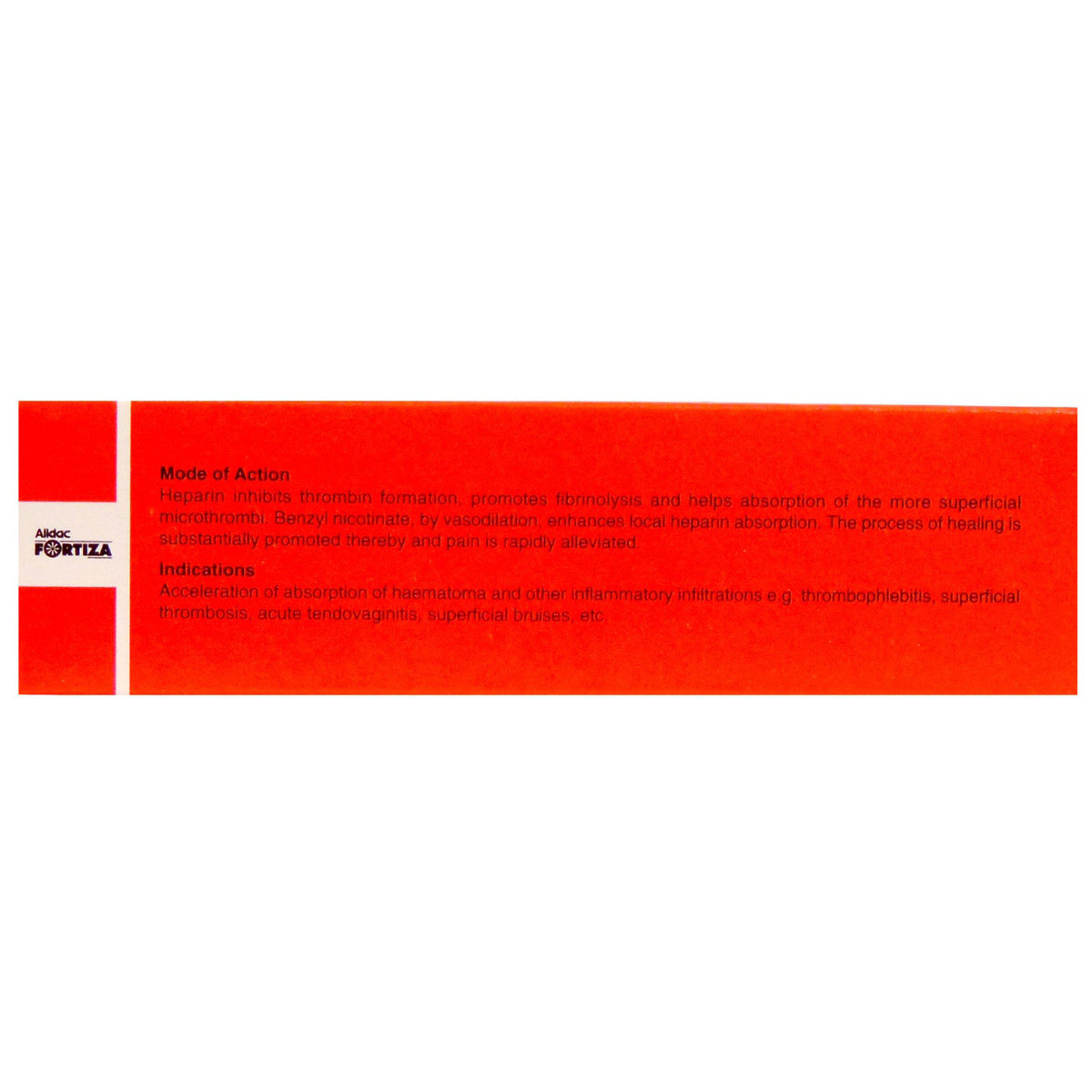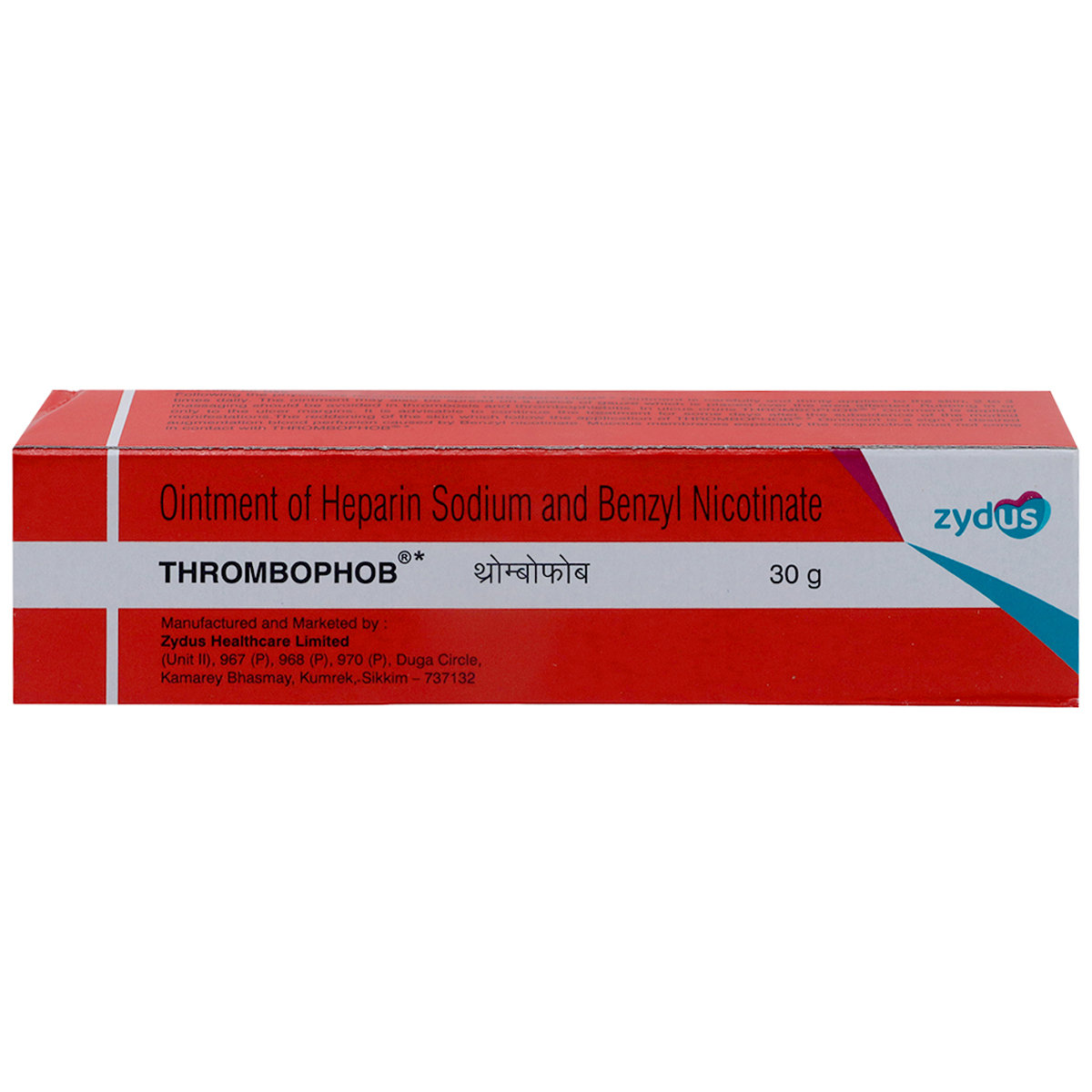- Home
- Swithromb Ointment
Swithromb Ointment Substitute
Swithromb Ointment Substitute
Medicine Composition:
BENZYL NICOTINATE-2MG + HEPARIN-50IUAll Substitutes & Brand Comparisons
RX
Out of StockThrombomark Ointment 10 gm
Mankind Pharma Pvt Ltd
₹40
(₹3.52/ 1gm)
319% COSTLIERRX
Out of StockThrombowock Ointment
Wockhardt Ltd
₹82
(₹3.69/ 1gm)
339% COSTLIERRX
Thrombobak 20G Oint
May & Baker Pharmaceuticals Ltd
₹85
(₹3.83/ 1gm)
355% COSTLIERRX
Out of StockUnithromb Ointment
Unimarck Pharma India Ltd
₹90
(₹4.05/ 1gm)
382% COSTLIERRX
Out of StockTM Phob Ointment
Morepen Laboratories Ltd
₹91
(₹4.1/ 1gm)
388% COSTLIERRX
Out of StockSuprathrob Ointment 20 gm
Wockhardt Ltd
₹93.5
(₹4.21/ 1gm)
401% COSTLIERRX
Out of StockThermothur Ointment 20 gm
Elder Projects Ltd
₹110
(₹4.95/ 1gm)
489% COSTLIERRX
Thrombomed Ointment 20 gm
Phlebocare Lifescience
₹118.5
(₹5.93/ 1gm)
605% COSTLIERRX
TM Phob Ointment 20 gm
Morepen Laboratories Ltd
₹135.5
(₹6.1/ 1gm)
626% COSTLIERRX
Thrombophob Ointment 20 gm
Zydus Healthcare Ltd
₹136.5
(₹6.15/ 1gm)
632% COSTLIERRX
Thrombophob Ointment 30 gm
Zydus Healthcare Ltd
₹225.5
(₹7.52/ 1gm)
795% COSTLIER

When Should You Consider Switching from Swithromb Ointment?
Patients may explore substitutes in the following scenarios:
- High monthly cost of Swithromb Ointment
- Non-availability in local pharmacies
- Generic recommendation by a doctor
- Side effects or better tolerability with alternatives
What to Know Before Switching
Before you switch from Swithromb Ointment to another medicine, here are some important points to keep in mind:
Same salt, different brands:
Most substitutes contain the same active ingredient - BENZYL NICOTINATE-2MG + HEPARIN-50IU, but the fillers, coating, or manufacturing quality may vary slightly.
Consult your doctor first:
Even if the salt is the same, your doctor can confirm if the substitute is right for your condition, dosage, and health history.
Watch out for allergies or reactions:
Some people may react differently to certain brands due to inactive ingredients. If you notice any side effects, inform your doctor immediately.
Price ≠ effectiveness:
A lower-priced substitute doesn't mean it's less effective. Many generic medicines work just as well as branded ones.
Check the dosage form and strength:
Always match the substitute’s strength (e.g., 5mg, 10mg) and form (tablet, capsule, syrup) with what your doctor prescribed.
Uses
Swithromb Ointment is used in the treatment of Superficial Thrombophlebitis. The detailed uses of Swithromb Ointment are as follows:
- Relief for Varicose Veins: Swithromb Ointment is frequently used to alleviate the discomfort caused by varicose veins. It effectively reduces swelling, pain, and irritation associated with enlarged veins.
- Post-Surgical Recovery: After vein-related surgical procedures, Swithromb Ointment aids in the healing process. It can be applied to the affected areas to minimise swelling and accelerate recovery.
- Sprains and Strains Management: Swithromb Ointment is beneficial for addressing minor injuries, such as sprains and strains. It helps relieve pain and inflammation, ensuring faster relief.
- Bruise Treatment: Swithromb Ointment promotes better circulation and speeds up the healing of bruises. It also helps diminish discolouration for a quicker recovery.
Medicinal Benefits
- Swithromb Ointment is a topical medication that contains Heparin and Benzyl Nicotinate, used to treat superficial thrombophlebitis (inflammation of a vein near the surface of the skin).
- Benzyl Nicotinate acts as a vasodilator, helping widen the blood vessels. This enhances local blood flow, delivering oxygen and nutrients to the affected area for faster healing.
- Heparin is an anticoagulant that helps break down existing clots and prevents the formation of new ones.
- It also has anti-inflammatory effects, helping reduce local swelling, redness, and pain at the site of inflammation or thrombosis.
- The improved blood flow and anti-inflammatory properties of both components contribute to quicker tissue repair and relief from symptoms.
- By reducing clotting and inflammation, Swithromb Ointment provides symptomatic relief from pain, tenderness, and discomfort associated with venous disorders.
FAQs
The substitutes of Swithromb Ointment contain the same active salt(s) - BENZYL NICOTINATE-2MG + HEPARIN-50IU. However, they may differ in price, manufacturing quality, and inactive ingredients. Speak to your doctor to find a suitable option.
Switching to a generic substitute medicine in the place of Swithromb Ointment is often possible if it has the same salt, strength, and dosage form. But always check with your doctor before making any changes to your medication.
Generics versions of Swithromb Ointment are typically more affordable because they don’t include the original brand's research, development, and marketing costs. They contain the same active ingredient and are approved for safety and effectiveness.
Most people don’t notice any difference. However, some may react to different fillers or coatings. If you notice any unusual symptoms after switching, consult your doctor.
Make sure the new medicine has the same active salt, strength, dosage form. Always confirm the change with your doctor or pharmacist.
Substitutes of Swithromb Ointment meet the same safety and efficacy standards as Swithromb Ointment, but small differences in absorption or formulation can exist. A doctor can help you choose the right one for your needs.
Yes. Substitutes of Swithromb Ointment may vary in color, size, or shape due to differences in manufacturing and branding, but this does not affect how they work.
Yes, it’s generally safe to switch between multiple substitutes of Swithromb Ointment if they have the same salt and strength. However, always inform your doctor so they can monitor how your body responds.
Yes, many people safely use substitutes of Swithromb Ointment for long-term treatment. Just ensure it’s done under medical supervision.
If your symptoms stay under control or lab results remain stable, the substitute for Swithromb Ointment is likely working well. Regular follow-ups with your doctor are important.
Absolutely. Even with the same salt, small differences can affect how your body responds when switching from Swithromb Ointment to its substitute. Always consult your doctor before switching.
Swithromb Ointment is used to treat superficial thrombophlebitis. Superficial thrombophlebitis is a condition in which there is inflammation and swelling just below the surface of the skin due to a blood clot.
Swithromb Ointment is a combination of two medicines: Heparin and Benzyl nicotinate. Heparin is an anticoagulant and acts by dissolving the existing clots and preventing the formation of new blood clots. Benzyl nicotinate is a vasodilator (dilates the blood vessels). It improves blood flow to the affected area. Together, Swithromb Ointment can effectively reduce the symptoms of superficial thrombophlebitis such as pain and inflammation.
Swithromb Ointment is not recommended for the treatment of skin ulcers or open wounds. It can treat superficial thrombophlebitis, a condition characterised by pain and inflammation due to clot formation in the veins beneath the skin surface.
Swithromb Ointment may cause application-site reactions such as redness, itching, burning sensation, and irritation. These side-effects are usually mild and go away without any treatment. However, if any of these side-effects persist or get worse, consult a doctor immediately.
It is advised not to use Swithromb Ointment on broken skin and open wounds, and make sure the medicine doesn't come in contact with the eyes, nose, mouth, or genital area. It may increase skin sensitivity to the sun, so avoid prolonged sun exposure, tanning beds, and sun lamps. Wear protective clothing if you are going outdoors in the daytime.
Swithromb Ointment contains heparin, which is an anticoagulant (blood thinner). The use of heparin before surgery can lead to prolonged bleeding. So, it is recommended to inform your doctor before using Swithromb Ointment if you are undergoing surgery.
It is not recommended to use Swithromb Ointment for heat boil. Swithromb Ointment is intended to treat superficial thrombophlebitis (inflammation of a vein near the skin's surface). If you're experiencing a heat boil, it's essential to consult a doctor for proper evaluation and treatment. They may recommend topical or oral antibiotics, pain management, or other treatments depending on the severity and location of the boil.
Swithromb Ointment is not intended to treat piles (haemorrhoids). It is used to treat superficial thrombophlebitis and its related conditions.
Swithromb Ointment can help alleviate varicose vein symptoms like pain, inflammation, and poor blood flow. However, Swithromb Ointment should be used only if the doctor advises you to use it to treat your condition.
There is insufficient data available to establish the safe use of this medicine in children. So, please consult a doctor before using Swithromb Ointment in children.
Swithromb Ointment may help alleviate symptoms associated with strains, sprains, and bruises. However, it should be used only if advised by the doctor after careful evaluation of your condition.
Swithromb Ointment may help reduce injection swelling after vaccination, but consult your doctor first. They will assess the swelling and recommend the best treatment, which may include Swithromb Ointment or other options.
Do not use Swithromb Ointment for acne, as it is not intended to treat acne.
Burns are not usually treated with Swithromb Ointment. For the treatment of burns, it is important to consult with a physician.
Swithromb Ointment is primarily used to treat superficial thrombophlebitis, an inflammation of the surface veins.
Consult your doctor before stopping Swithromb Ointment, even if your symptoms have improved. Your doctor will assess your condition and recommend the appropriate course of action, which may include continuing or tapering off the treatment to ensure optimal recovery and prevent recurrence.
Buy best Vascular System products by
Emcure Pharmaceuticals Ltd
Intas Pharmaceuticals Ltd
Leeford Healthcare Ltd
Ozone Pharmaceuticals Ltd
Sun Pharmaceutical Industries Ltd
Cipla Ltd
Lupin Ltd
Macleods Pharmaceuticals Ltd
Torrent Pharmaceuticals Ltd
Mercury Laboratories Ltd
Abbott India Ltd
Akumentis Healthcare Ltd
FDC Ltd
Samarth Life Sciences Pvt Ltd
Walter Bushnell
Dr Reddy's Laboratories Ltd
Grifols India Healthcare Pvt Ltd
Indoco Remedies Ltd
Mankind Pharma Pvt Ltd
Morepen Laboratories Ltd
Oaknet Healthcare Pvt Ltd
Reliance Formulation Pvt Ltd
Wanbury Ltd
Alembic Pharmaceuticals Ltd
East West Pharma India Pvt Ltd
Galcare Pharmaceuticals Pvt Ltd
Juggat Pharma Ltd
Kee Pharma Ltd
Knoll Pharmaceuticals Ltd
Kontest Pharmaceuticals
La Pristine Bioceuticals Pvt Ltd
Pfizer Ltd
Prevego Healthcare & Research Pvt Ltd
Saf Fermion Ltd
Serdia Pharmaceuticals India Pvt Ltd
Systopic Laboratories Pvt Ltd
Theia Health Care Pvt Ltd
Themis Chemicals Ltd
Themis Medicare Ltd
Aarux Pharmaceuticals Pvt Ltd
Akcent Healthcare India Pvt Ltd
Amelia Healthcare Pvt Ltd
Bharat Serums and Vaccines Ltd
Canixa Life Sciences Pvt Ltd
Capital Pharma
Chemo Healthcare Pvt Ltd
Elbrit Life Sciences Pvt Ltd
Eris Life Sciences Ltd
Eysys Pharmaceutical Pvt Ltd
German Remedies Ltd
Glenmark Pharmaceuticals Ltd
Ipca Laboratories Ltd
Johnlee Pharmaceuticals Pvt Ltd
Nexgen Rx Life Science Pvt Ltd
Rapross Pharmaceuticals Pvt Ltd
Rockmed Pharma Pvt Ltd
Sterkem Pharma Pvt Ltd
Sumac Pharma Pvt Ltd
Themis Pharmaceutical Ltd
4Care Lifesciences Pvt Ltd
Aar Ess Remedies Pvt Ltd
Albert David Ltd
Alna Biotech Pvt Ltd
Aphia Healthcare
Apios Lifesciences Pvt Ltd
Aristo Pharmaceuticals Pvt Ltd
BSA Pharma Inc
Baxter India Pvt Ltd
Bennet Pharmaceuticals Ltd
Biosys Pharmaceuticals Ltd
Bros Enterprises Ltd
Cadila Pharmaceuticals Ltd
Calren Care Lifesciences Pvt Ltd
Celebrity Biopharma Ltd
Cibeles Pharmaceuticals Pvt Ltd
Comed Chemicals Ltd
Conatus Healthcare Pvt Ltd
Cresha Lifesciences
Cute Care Life Sciences Pvt Ltd
Cytogenix Pharmaceuticals Pvt Ltd
Dermacia Healthcare
Ethinext Pharma
Euro Biogenics
Fling Pharmaceuticals Pvt ltd
Genees Pharmaceutical Pvt Ltd
Icon Life Sciences
J B Chemicals & Pharmaceuticals Ltd
Kemiq Lifesciences Pvt Ltd
Kivi Labs Ltd
Knoll Healthcare Pvt Ltd
Lincoln Pharmaceuticals Ltd
Medchronic Health Care
Medgen Drugs And Laboratories Pvt Ltd
Medishri Healthcare Pvt Ltd
Megma Healthcare Pvt Ltd
Neocardiab Care
Novartis India Ltd
Olcare Laboratories Pvt Ltd
Ornate Labs Pvt Ltd
PNOVAE PHARMACEUTICAL INDUSTRIES PVT LTD





